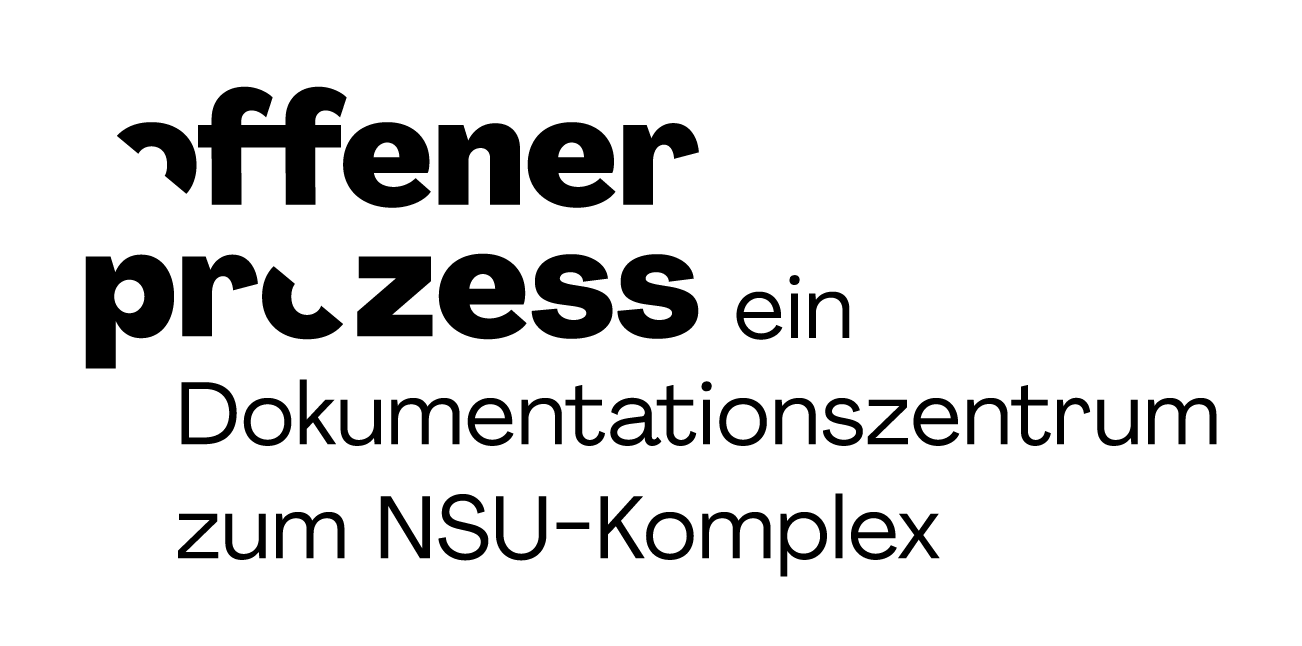What are the plans?
The «Pilotvorhaben für ein Dokumentationszentrum zum NSU-Komplex in Sachsen» will be part of Chemnitz’s European Capital of Culture 2025 programme. It is designed as a temporary project until a permanent solution is found that is supported at the national level. The Centre will comprise an exhibition titled «Offener Prozess», a research unit, an archive, educational programmes, online resources, as well as a space for commemoration and encounters.
Why «Pilotvorhaben»?
We do not want to wait for the creation of a permanent documentation centre. Instead, we see the project as a milestone on the way to creating a Germany-wide NSU documentation centre. The concept for the «Pilotvorhaben für ein Dokumentationszentrum zum NSU-Komplex in Sachsen» is based on the feasibility study conducted by RAA Sachsen e.V. and ASA-FF e.V.
Feasibility study, «Pilotvorhaben» and national documentation centre: what’s the difference?
The «Pilotvorhaben für ein Dokumentationszentrum zum NSU-Komplex in Sachsen» is an independent project run by three partner organisations: ASA-FF e.V., RAA Sachsen e.V. and the Initiative Offene Gesellschaft e.V.
It is separate from the concept and feasibility study for an NSU documentation centre in southwest Saxony that was presented in May 2023 and conducted by RAA Sachsen e.V. in collaboration with ASA-FF e.V. The Initiative Offene Gesellschaft e.V. is supporting the creation of the «Pilotvorhaben für ein Dokumentationszentrum zum NSU-Komplex in Sachsen» and has contributed insights and recommendations.
As our project takes shape, the federal government has been discussing the creation of a national documentation centre since 2021, and the debate remains ongoing. Our project leads are in touch with Germany’s Federal Agency for Civic Education (Bundeszentrale für politische Bildung) and will be sharing insights as our project progresses.
Who is funding the project?
The «Pilotvorhaben für ein Dokumentationszentrum zum NSU-Komplex in Sachsen» is funded by the Saxon State Ministry of Justice and for Democracy, Europe and Equality.
When will the «Pilotvorhaben für ein Dokumentationszentrum zum NSU-Komplex in Sachsen» open?
When will the «Pilotvorhaben für ein Dokumentationszentrum zum NSU-Komplex in Sachsen» open?
The «Pilotvorhaben für ein Dokumentationszentrum zum NSU-Komplex in Sachsen» will open in spring/summer 2025, as part of Chemnitz’s European Capital of Culture 2025 programme.
Who is developing the concept?
The concept has been created by three civil society partners: ASA-FF e.V., RAA Sachsen and the Initiative Offene Gesellschaft. At various stages, we have taken a participatory approach, inviting input from other stakeholders and partners. Within our partnership, we have been consulting the victims and families as well as the federal government’s ombudsperson for the NSU victims’ families.
How will the public engage with the project?
The «Pilotvorhaben für ein Dokumentationszentrum zum NSU-Komplex in Sachsen» will be a space that foregrounds the value of experience and knowledge. We will engage with the public and our respective audiences through exhibitions, educational projects and encounters. As 2025 draws closer, we will develop an overarching curatorial concept to add context and detail to these activities.
What does the term “NSU” refer to?
Enver Şimşek, Abdurrahim Özüdoğru, Süleyman Taşköprü, Habil Kılıç, Mehmet Turgut, İsmail Yaşar, Theodoros Boulgarides, Mehmet Kubaşık, Halit Yozgat, Michèle Kiesewetter: these are the names of the people murdered by the National Socialist Underground between 2000 and 2007. A dozen more were injured or traumatised by three bomb attacks and 15 robberies.
The NSU’s crimes were facilitated by:
- broad support from the neo-Nazi scene, which continues to exist: only few individuals have faced criminal prosecution to date,
- the intertwining of German intelligence agencies in the scene – intelligence agencies which later enjoyed substantial increases in staff and funding,
- structural and institutional racism within the criminal authorities, who still lack comprehensive and effective measures to tackle this issue,
- an overwhelming racist bias within the media and mainstream society – a bias that continues to shape political, media and public discourse; and
- a lack of visibility of and solidarity with the victims throughout civil society institutions and wider society – a matter of justice that merits greater scrutiny in light of the current wave of right-wing terror.
The term used to explore these various aspects is “the National Socialist Underground” or “NSU”.
